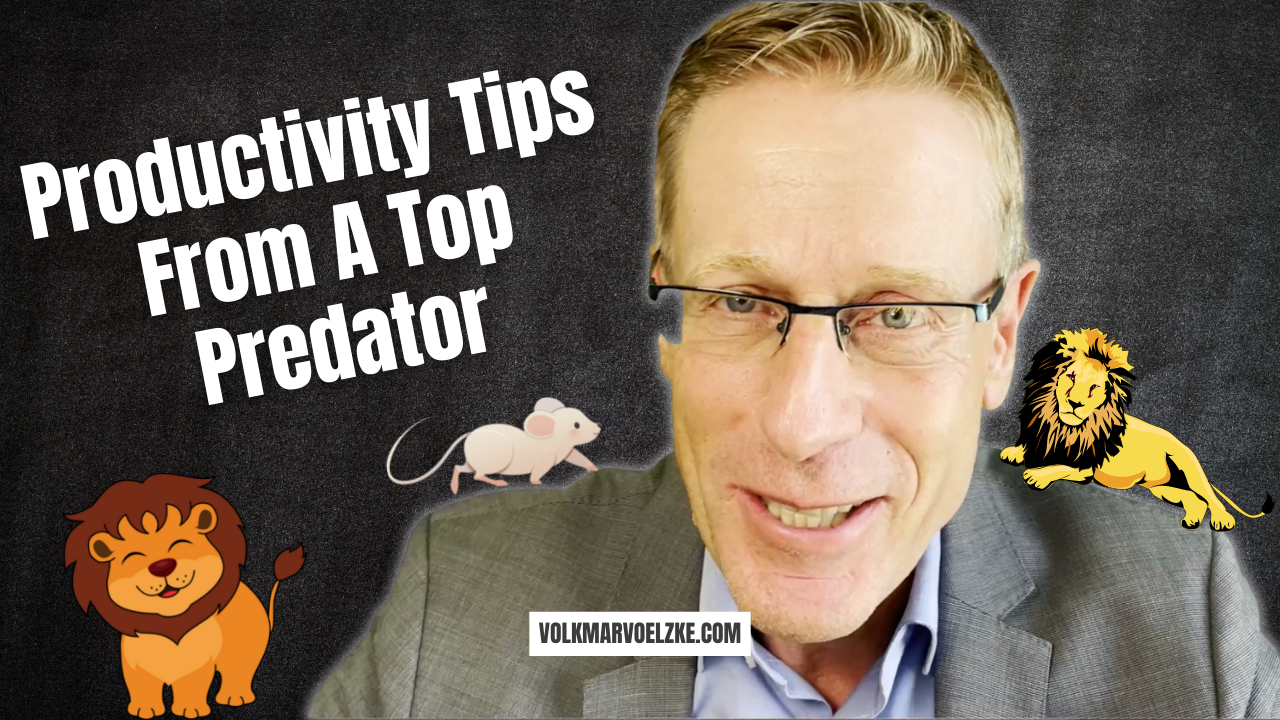🤷 Why We Make Things More Complicated Than They Are

After all, there are various things that stand in our way on the path to greater success and fulfillment. One of them is the tendency to make things more complicated than they are.
Now, don't tell me that this doesn't affect you. I bet that if I were to observe you, we would identify various things that you are making more complicated than they need to be.
To get to the root of the matter, I share below:
- three main causes,
- then the main effects (i.e., how you recognize unnecessary complicatedness), and
- three steps you should take to make the complicated simple.
Let's get started with the three most important reasons:
- Feeling of power. Of course, when things are complicated, not everyone can understand them. But if you're the one who has some perspective, it gives you a sense of power. Entire professions are riddled with complicated language, partly for this very reason (lawyers, doctors, etc.).
- Sense of security. Paradoxically, it can feel safer when things are complicated than...
🦁 Productivity Tips From A Top Predator

We often learn the most when we leave our traditional thinking patterns and embark on a journey of discovery.
Then, many things become clear that would otherwise remain hidden. This is also the case in the following little story:
Imagine the most powerful predator of the savannah, the lion, lying there in the shade of a tree. He's a little hungry and soon the pack will go hunting again.
At that moment, a mouse (or a similar small animal) crawls along in front of him. It would be an easy prey. And yet the lion will not lift a finger (I mean: claw).
Why? Because the nutritional value of a mouse barely exceeds the energy expended to catch and digest it. If the lion hunted mice, he would have to starve.
What does he hunt instead? Something much more difficult, namely gazelles, antelopes and even buffalos. Why? Because that's the only thing that produces the results the pride needs to survive. The ratio of return to effort is much better, even taking into account the considerable effort...
🫣 Why Your People Don't Take Responsibility

This is one of the most common themes I encounter in leadership coaching: How can I get my people to take more responsibility?
The significance is clear: when someone takes on full responsibility, there is no blame, things get done faster, I can always rely on the other person, and so on.
Here is my hypothesis: most people like to take responsibility. It's just that it's constantly being taken away from them, even by their manager.
This is similar to motivation: Most people are motivated. They are just constantly demotivated by others, especially by their boss.
So the key question is: What are you doing to take responsibility away from your people without realizing it?
Here are three key behaviors you're teaching others to be irresponsible without noticing (and then I'll give you three tips on what to do instead):
- Too many instructions. Rules, processes and instructions have their purpose. But at the same time, they reduce the sense of responsibility. Because it wasn't me who made...
😁 How To Boost Your Fun With Leadership

This is an extremely important topic today, where I see a lot of potential in most people. Most of the leaders I meet have fun in their job. They love the technical work.
Most of them have much less fun leading people.
Many associate leadership with a burden rather than the opportunity to achieve great things together with others. Thoughts turn to difficult "appraisal interviews," salary negotiations, conflict resolution, remembering deadlines and tasks, and so on.
These are all topics that are, of course, less fun. And that's also management rather than leadership.
The journey to fun leadership starts in the mind, namely with what I associate with leadership and how I see myself as a leader (for inspiration, you may also want to read the blog post about the success coach Jürgen Klopp that I published a few weeks ago).
When I coach leaders, I usually see a clear evolution from "leadership as a burden" to "leadership as an opportunity and source of joy" ( you can find more info...
🧗 How To Accomplish Big Things With Small Steps

Actually, we all know this: If you consistently march in the same direction with small steps, you will progress faster than someone who takes big leaps in repeatedly different directions.
The reason for the high effectiveness of small consistent steps is the compounding effect, which then leads to exponential growth.
However, we tend to forget this wisdom. Our brain is programmed to pay more attention to what is new than to what remains the same.
Why is this important at all?
Well, any sustainable increase in performance and success, any improvement in teamwork, and any other improvement in corporate culture requires changing mindsets, behaviors, and habits.
And these changes only work through constant repetition with positive reinforcement.
The good news is: you often don't need a huge one-time effort to make powerful things happen. Repeating similar steps in the same direction over and over again is enough.
Here are three moves you can take to successfully implement this insight:
...⏰ Reminder: Your Daily Routines

Over half of the year has passed, so I think it’s time for a little reminder about your daily routines. What is your daily performance level? Are you satisfied with your daily results or do you see room for improvement?
Here are three proven tips on how you can grow your performance each day:
- Start fast. The first minutes of your day set the tone for the rest of your day. If you take it easy during the first 30-60 minutes, you signal to your subconscious mind that you can relax the entire day. If you do this repeatedly, you will have a hard time ever achieving high-performance throughout the day. That’s exactly what you see with many people.
- Eliminate decisions. Each decision we make requires energy and willpower. The most accomplished people eliminate decision needs wherever possible, e.g. on breakfast choices, what to wear, etc. By this, they have more energy for the truly important things.
- Schedule power blocks. Work for 60-90 minutes on one task with no...
🌩 Your Cognitive Dissonance

Today we're talking about a common phenomenon that gets in the way of our influence and success more often than we'd like to admit: cognitive dissonance.
This is a term from psychology that describes how, in many cases, when reality does not match our expectations, we prefer to reinterpret reality rather than adjust our expectations.
This can sometimes be useful in the sense that we try everything to change reality according to our goals. But it can also often lead us to disconnect more and more from reality and our environment.
This phenomenon can creep in anywhere and often occurs - but not only - in the executive suites of larger companies.
Why there in particular? Because more personal ego is involved: the more I manifest my expectations and couple them to my personality, the more difficult it is to adjust these expectations. The way out: I choose to interpret reality differently.
Now, as a leader, how can you escape this trap? I recommend three steps:
-
Listening well to...
🏋️♀️ Three Hacks To Grow Team Productivity By 25%

The amazing fact is that all teams can become more productive. Why is it, then, that most teams stay at their current levels, even if productivity gains could be relatively easy to achieve?
The simple answer: most people feel comfortable and safe in their current state.
This includes business leaders, teams, and entire organizations. Change is hard, even if this change means improvement. That’s why most obese people stay obese, smokers continue smoking, and people don’t become better leaders.
Despite these challenges, here are 3 strategies to grow your team productivity by 25% or more:
- Increase clarity. This sounds so simple and yet, most teams I see are not entirely clear about their mission, their vision, their standards, and other core elements of high-performing teams. Remember: nobody engages completely while uncertain.
- Increase passion. Too many teams are just “doing their job”, but lack any inspiration and full commitment....
🖼 How You Create Your Reality

Unfortunately, at the moment we see once again a vivid (and very sad) example of how a leader can get "his" people behind him to carry out certain actions.
Of course, I mean - you guessed it - the example of Putin and the Russian war of aggression on Ukraine. The aim of this article is not to take a political stand (although I do, of course), but to point out the mechanisms that have their effect here in the negative, but which - and this is the crucial lesson - can also be used for good.
What actually happened in Putin's Russia?
Essentially, there are three crucial elements that come together to send people to war and death with their consent (I then explain how you can use these correlations in the positive sense for your team or company):
- Consistent Story. For decades, the same version of the story has been and continues to be told and taught in schools: Russia is constantly threatened by other powers and must defend itself for "what is rightfully ours".
- Identity. Identity is...
⚽️ What We Can Learn From The Success Coach Klopp

I don't know to what extent you are interested in football. Even if you're not, this blog post has some ideas that might be useful for you as a leader.
I'm using Jürgen Klopp as an example since it's always worth taking a closer look at outstanding leaders. Because you can learn from them in any case, no matter how good you already are at leadership yourself.
Jürgen Klopp is currently one of the most successful soccer coaches in the world (some say "THE best") and has just been to the Champions League final with his club Liverpool FC. He has some tremendous successes to his name - and manages to remain a very "normal" person in the process.
His specialty seems to be to form outstanding teams out of rather average ones, which sustainably achieve top performance while having fun (by the way, completely according to the idea of my book " Business Fitness: Get out of Mediocrity!", published by Springer Gabler, more info here, only in German).
Since I know that many of my...
